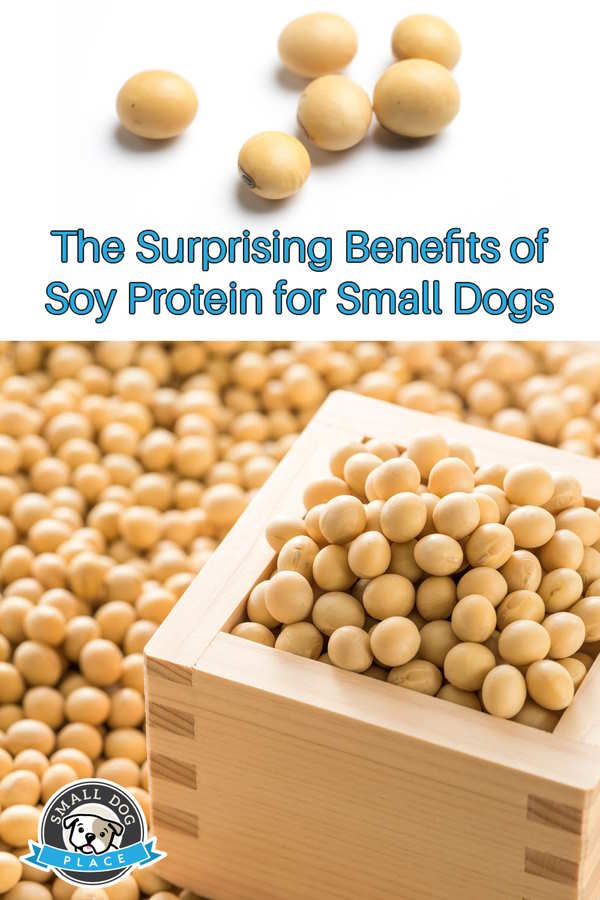The Surprising Benefits of Soy Protein for Small Dogs
Soy Protein for Small Dogs by Rebecca Daniel |04-16-2023
Soybean, also known as soya bean or simply soy, is widely considered a superfood. That’s due toits abundance of essential nutrients.
But can these nutrients benefit our canine friends too? Can dogs eat soy?
Well, these questions shall be the focus of this article. Read below as we delve deep into the
surprising benefits of soy for small dogs, with a particular focus on soy protein.
 Photo Credit: Pixabay.com
Photo Credit: Pixabay.comWhat Is Soy Protein?
Soy protein is obtained from soybeans and is widely touted as a healthier replacement for animal-derived protein. The past few years have witnessed a tremendous surge in demand for plant-based protein, with soy protein at the center of the buzz.
The growing interest in soybeans has translated to increased international soy production. Soy-based products are now available in multiple formulations. There are also widespread, ongoing initiatives to foster sustainable soybean cultivation
practices. Such campaigns are intended to avert a possible shortage of these nutritious legumes.
Can Dogs Eat Soy?
Soy is essentially a plant. That description may instill
reservations in some dog owners about feeding this legume to their canine
friends.
But contrary to popular belief, dogs are omnivores and
not carnivores. That means Fido is just as happy to snack on plant-based foods
as animal-derived foods.
The main dietary difference between dogs and other
omnivores is that these adorable creatures typically prefer a diet comprising
up to 80% of animal products, with plant-based foods taking up the remaining
portion. You may have realized that although it’s conspicuously present in many
dog foods, soy typically appears in small amounts.
So, while soybeans can offer immense benefits to your
pup, serving the legumes in small portions and only as an occasional treat is
essential. This is especially true for puppies whose digestive systems aren’t
completely developed, which means they can react more dramatically to
unfamiliar foods.
 Photo Credit: Pixabay.com
Photo Credit: Pixabay.comHow Might Soy Protein Benefit Your Small Dogs?
Although not a staple ingredient in most dog foods, soy
is a protein-rich food that may benefit your pups in many ways.
For starters, soy boasts the highest protein quantity by
weight of any food. According to the United States
Department of Agriculture (USDA),
a 100-gram serving of fresh soybeans provides 36 grams of protein.
Below is how the same serving amount of popular
animal-based protein sources compare with soy;
- Beef –
26 grams - Pork –
27 grams - Chicken
– 27 grams - Turkey –
29 grams - Salmom–20
grams
Another reason to feed soy protein to young dogs is that
soybeans abound in all nine essential amino acids and eleven nonessential amino
acids.
Amino acids are distinct molecules that combine to form
proteins. These molecules are grouped into two major categories – Nonessential
and Essential.
Nonessential amino acids are those the body can produce
on its own, while essential amino acids must come from the foods your dog
consumes.
Here are the nine essential amino acids in soy and how
each might benefit your small dog.
1. Threonine
Threonine is the primary amino acid-producing structural protein like collagen and elastin. Dogs, particularly puppies, need this compound to maintain a radiant coat.
Threonine is also involved in fat metabolism. Therefore, it can help keep your puppy’s weight in check.
2. Methionine
Like threonine, methionine plays a role in fat metabolism. The compound can also help remove toxins from your pup’s body.
Besides, methionine absorbs other essential minerals like zinc and selenium.
3. Tryptophan
Is your pup struggling with inappetence, insomnia, or mood swings? Then feeding him soy protein might make a world of difference.
Soy is rich in tryptophan, an amino acid that stimulates the secretion of serotonin, a feel-good neurotransmitter noted
for its positive effects on appetite and mental relaxation.
4. Leucine
Leucine is another BCAA responsible for muscle growth and
repair. This amino acid is also involved in blood sugar regulation. Therefore,
it might protect your pup from unhealthy blood sugar spikes.
Other noteworthy functions of leucine include stimulating
wound healing and aiding the production of growth hormones.
5. Histidine
Like humans, dogs secrete the hormone histamine in response to allergens, pathogens, and inflammation. Histidine is the amino acid responsible for stimulating histamine production.
Histamine can regulate your pup’s sleep-wake cycles, digestive processes, and sexual functions. And it’s great to know that soy protein abounds in this essential amino acid.
6. Lysine
Lysine is an essential amino acid involved in calcium absorption, an important mineral that helps maintain the health of your dog’s bones and teeth while aiding muscle regeneration.
Lysine also boosts the production of certain hormones, enzymes, and the structural proteins collagen and elastin.
Collectively, the proteins in soy may stimulate feelings of fullness for longer by inducing the release of CCK in your dog’s gut.
Longer feelings of satiation consequently reduce food cravings and hunger pangs. It’s a natural way to cushion your pups from unhealthy weight gain and lifestyle diseases like obesity and diabetes.
Other Benefits of Soy for Small Dogs
Besides its high protein content, soy abounds in many other nutrients your pup can benefit from.
A noteworthy mention is a dietary fiber, which works synergistically with protein to promote feelings of satiation for longer. Fiber also aids regular bowel movements, making it a welcome addition for small dogs battling constipation.
Soy is also high in omega-3 fatty acids, noted for their anti-inflammatory properties. Not to mention disease-fighting antioxidants like isoflavones, saponins, and phytic acid.
Final Word About Soy Protein for Small Dogs
Soy protein is a healthy replacement for animal-based protein sources, not only for humans but also for dogs. Remember to consult your vet before introducing soy into your pup’s diet. Also, observe the moderation rule while feeding your dog soybeans or other unfamiliar foods.
Soy Protein for Small Dogs
Author Bio
Rebecca Daniel, based in California, is an avid writer, with many years of blogging experience. She had been working as a professional writer for a while but now she goes on as a freelancer, devoted to enhancing her own knowledge in various niches and helping others do the same through her writings.
When she’s not writing you can find her traveling and taking care of her dog, Zoro.

Does This Article Deserve Your Thumbs Up?
We always appreciate your support and encouragement. Your thumbs up means so much to us. Please like this article.
If you find this page or any page on Small Dog Place Helpful, or Useful in anyway, I’d love it if you would click the small heart found on the bottom right of each page.
You can also share or bookmark this page — just click on the:
Your second block of text…

Free Monthly Newsletter
Sign Up for Our Free Newsletter and get our Free Gift to You.
my E-book, The Top 10 Mistakes People Make When Choosing a Dog (and how to avoid them)




